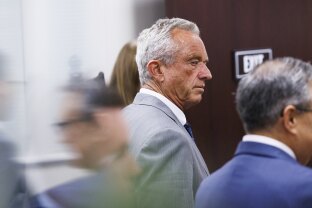A flood of outside groups are loudly trying to influence senators on the high-pressure confirmation of Robert F. Kennedy Jr. as Donald Trump’s health secretary, with ads, press conferences and private meetings.
But an inside group is moving much more quietly: the swing senators on the committees running this week’s hearings.
Sen. Bill Cassidy, chair of the Health, Education, Labor and Pensions Committee, referred any questions to Kennedy to his press team, saying, “I’d rather not talk about it.” His press secretaries declined to comment.
Sen. Roger Marshall also deflected anything Kennedy-related, saying only that he’d have “a few” questions for Kennedy during his hearing.
Sens. Elizabeth Warren and Bernie Sanders also declined to comment on Kennedy, though Warren recently released a letter to the nominee detailing a long list of questions she has about his qualifications and record. Sanders held a virtual roundtable last week in which he discussed many of the issues Kennedy is known for having unorthodox opinions about.
Some of their colleagues, though, have given a window into the advocacy group tug-of-war over the confirmation.
“I’m talking to some more today. Practically every day,” said Sen. Ron Wyden, ranking member of the Senate Finance Committee, about public health groups that are worried about Kennedy’s potential impact. “These groups understand how high the stakes are.”
Wyden told NOTUS he couldn’t speak to whether these groups have been effective at convincing Republican senators to vote against Kennedy, but said that he has heard rumblings of discontent.
“My sense is there are a number of Republican senators who are very troubled by the stuff that’s on the record about his solutions,” said Wyden, citing Sen. Mitch McConnell as an example. Wyden said Republican senators have concerns about Kennedy’s views on abortion, among other things.
“My colleagues understand that this is a premier place where decisions about American health care are made and take it very seriously,” Wyden added.
Some Democratic senators loudly oppose Kennedy’s nomination — including Sens. Tammy Baldwin, Brian Schatz, Chris Murphy and Chris Van Hollen — are holding a press conference Thursday morning with Gov. Josh Green of Hawaii and the advocacy group Protect Our Care. The group runs the “Stop RFK War Room” initiative that’s funded anti-Kennedy ads targeted at Republican senators.
Baldwin said Green, an emergency medicine physician, will highlight Kennedy’s involvement with a measles outbreak in American Samoa.
“I certainly think it’s very valuable information for folks to have,” Baldwin said when asked if she hoped the press conference would persuade any senators to vote against Kennedy’s confirmation. She added that she sees value in reviewing Kennedy’s record on vaccines, his “conspiracy-oriented theories” and his selective use of scientific research.
Baldwin declined to preview her questions for Kennedy, saying only that they’d be based on her private meeting with the nominee and would depend on what senators on the Finance Committee ask him on Wednesday. Kennedy’s hearing with the HELP committee is on Thursday.
A Protect Our Care spokesperson, Maddie Twomey, told NOTUS that the group has had college student activists speak with Republican senators about Kennedy’s record.
“I think universities are getting clued in on what it would mean for their own funding and their communities,” Twomey said.
Twomey declined to say which senators spoke to students, but Protect Our Care has run anti-Kennedy ads in a number of senators’ states, including Sens. Susan Collins, Mitch McConnell, John Curtis, Mike Rounds and Joni Ernst.
Conservative groups have also entered the Kennedy fray. Mike Pence’s advocacy group, Advancing American Freedom, has funded a series of ads attacking Kennedy’s record in Republican states. These ads target Kennedy’s abortion record, which Pence has said is of great concern, but also Kennedy’s involvement with the measles outbreak in American Samoa, his unproven assertion that vaccines cause autism in children and his claims that the polio vaccine is linked to cancer.
But a number of Republican senators, including Sens. Lindsey Graham, Tommy Tuberville and Rand Paul, denied hearing from Advancing American Freedom or any other groups concerned with Kennedy’s abortion record.
Graham said he’s not really worried about Kennedy’s views on abortion. “Actually having talked with him, I felt there are not going to be any dramatic changes,” he said.
Sen. Lisa Murkowski might have offered a clue as to why some of her fellow Republicans have been quiet on Kennedy this week when she spoke about the backlash she’s faced after voting against Pete Hegseth’s nomination for secretary of defense.
“The Republican Party of Alaska is not excited at the fact that I did not line up and commit to supporting every single one of Donald Trump’s nominees, even before they’re nominated,” she said. “That’s how much of a litmus test we’re dealing with.”
—
Margaret Manto is a NOTUS reporter and an Allbritton Journalism Institute fellow.
Sign in
Log into your free account with your email. Don’t have one?
Check your email for a one-time code.
We sent a 4-digit code to . Enter the pin to confirm your account.
New code will be available in 1:00
Let’s try this again.
We encountered an error with the passcode sent to . Please reenter your email.


